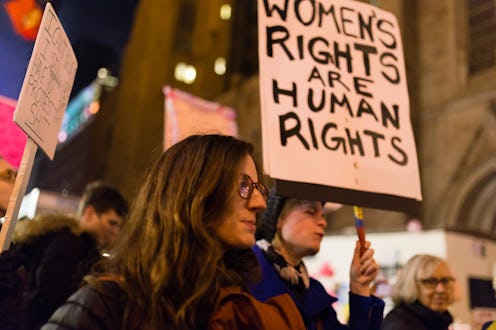News
Why Merriam-Webster's Pick For 2017 Word Of The Year Will Give All Feminists Hope

Every year, the Merriam-Webster Dictionary distinguishes one word that received increased attention and interest throughout the year. There's no disputing that a lot has happened in 2017, giving the dictionary plenty of words to choose from. But in the end, Merriam-Webster's 2017 Word of the Year was "feminism," putting a somewhat positive spin on the past year's chaos.
The word was one of the top lookups for the dictionary this year, increasing by 70 percent from 2016. Merriam-Webster explained on its website:
The general rise in lookups tells us that many people are interested in this word; specific spikes give us insight into some of the reasons why.
More people first began looking up the definition of "feminism" during January's Women's March that became an international spectacle, and the interest continued with "follow-up discussions regarding whether the march was feminist, and what kind of feminism was represented by organizers and attendees."
Other times the dictionary saw a spike in people looking up "feminism" included Kellyanne Conway saying she doesn't consider herself a feminist, the release of feminist entertainment such as The Handmaid's Tale and Wonder Woman, and the recent onslaught of sexual harassment allegations.
For anyone who hasn't yet looked up how Merriam-Webster describes "feminism," it includes "the theory of the political, economic, and social equality of the sexes" and "organized activity on behalf of women's rights and interests."
Noah Webster first entered the word "feminism" into an English dictionary in 1841, and the fact that it was originally defined as "the qualities of females" shows how far the word has come in the last two centuries. And in its explanation of why "feminism" was chosen as the 2017 Word of the Year, Merriam-Webster said the influx of lookups serves as a reflection on society.
No one word can ever encapsulate all the news, events, or stories of a given year — particularly a year with so much news and so many stories. But when a single word is looked up in great volume, and also stands out as one associated with several different important stories, we can learn something about ourselves through the prism of vocabulary.
The top two runner-ups were "complicit" and "recuse" — two words that suddenly became popular within American politics during the Trump administration. Merriam-Webster explained that spikes in people looking up "complicit" were tied to Ivanka Trump saying she didn't know what the word meant and subsequent Saturday Night Live parodies. Searches for "recuse" shot up surrounding Attorney General Jeff Sessions recusing himself from the the FBI's investigation into potential collusions between the Trump campaign and Russia.
Other Word of the Year contenders included "empathy," "dotard," "syzygy," "gyro," "federalism," "hurricane," and "gaffe."
With so many of the most searched words tied to politics, "feminism" being chosen as the word drawing the most interest speaks to the impact women had on the news cycle throughout the year. From politics, to entertainment, to business, feminist issues continued to hold the nation's attention during a period when there was often too much happening for anyone to stay up-to-date on every story.
The past two months alone have consisted of countless allegations of sexual harassment and assault against powerful men across industries. TIME magazine named "The Silence Breakers" 2017's Person of the Year last week as the #MeToo movement continues to out serial predators and start discussions around workplace harassment. Merriam-Webster's choice for Word of the Year also listed this movement as a driving force for people looking up the definition of "feminism," further reiterating the widespread impact of women's voices.
At the same time, though, the amount of people searching for a definition is disconcerting for feminists, as it highlights how many people still don't understand what it's all about. But, looking up "feminism" means people are making an effort to understand. Better late than never, as the saying goes.